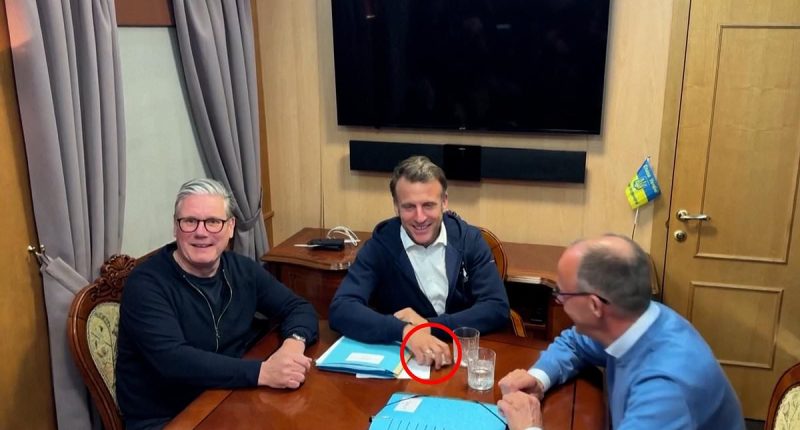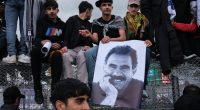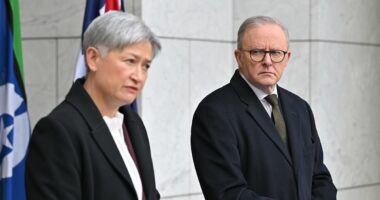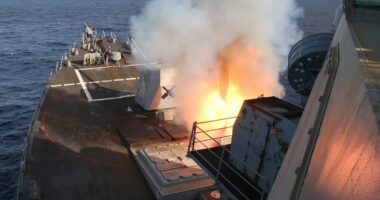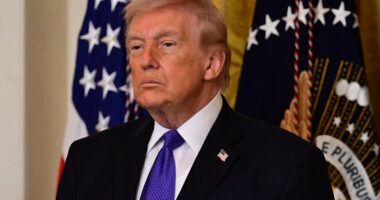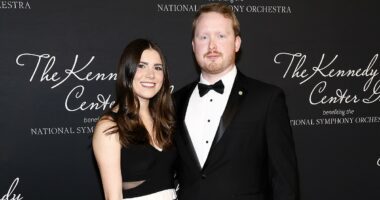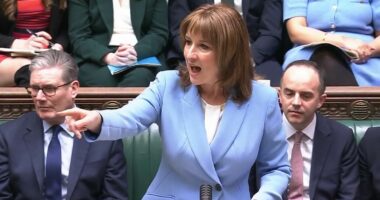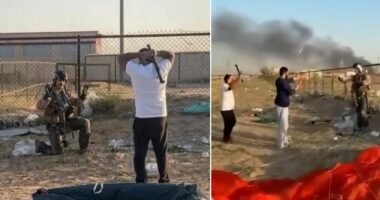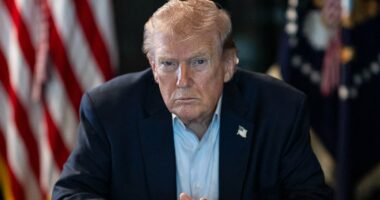Share this @internewscast.com

France has firmly refuted the false allegation that President Emmanuel Macron concealed a bag of cocaine while being photographed alongside Keir Starmer and Germany’s Friedrich Merz over the weekend.
The trio convened on Friday aboard a train traveling from Poland to Ukraine with the aim of meeting President Volodymyr Zelensky and urging Russia towards a ceasefire.
Despite their diplomatic intentions, the European leaders found themselves embroiled in unfounded internet accusations as pro-Russia social media accounts falsely claimed that Macron had concealed a bag of white powder during the photo opportunity with his colleagues.
Footage shows the French leader smiling at a camera before he subtly grabs a white item off the table and discretely conceals it under his arm.
Pro-Russian keyboard warriors were quick to fuel wild conspiracy theories claiming that Macron had stashed away a bag of cocaine.
‘Macron, Starmer and Merz caught on video on their return from Kiev. A bag of white powder on the table. Macron quickly pockets it, Merz hides the spoon. No explanation given,’ one X account posted.
The French government quickly blasted the false claim, clarifying that the item on the table was a tissue.
‘When European unity becomes inconvenient, disinformation goes so far as to make a simple tissue look like drugs,’ the Elysee said in an X post on Sunday night.
‘This fake news is being spread by France’s enemies, both abroad and at home. We must remain vigilant against manipulation.’
The French presidency’s official X account added an image of Macron, Starmer and Merz shaking hands inside the carriage, captioning the image: ‘This is European Unity.’
Far-right propagandists were reportedly behind the false allegations involving France’s president.
It comes after the European powers threw their weight behind an unconditional 30-day ceasefire and threatened Russian leader Vladimir Putin with ‘massive new sanctions’ if he did not accept.
The leaders of Britain, France, Germany, Poland and Ukraine set the start of the ceasefire for May 12 at a meeting in Kyiv, during which they held a phone call with US President Donald Trump.
‘So all of us here together with the U.S. are calling Putin out. If he is serious about peace, then he has a chance to show it,’ British Prime Minister Keir Starmer told a press conference.
‘No more ifs and buts, no more conditions and delays.’
Soon after the European leaders’ announcement, the Kremlin appeared to pour scorn on it.
‘We hear many contradictory statements from Europe. They are generally confrontational in nature rather than aimed at trying to revive our relations. Nothing more,’ Kremlin spokesman Dmitry Peskov was quoted as saying by Russian news agency Interfax.
Peskov was later quoted by the state TASS news agency as saying that Russia would consider the ceasefire proposal, while Moscow has its own position.
Western sanctions against Russia have been toughened repeatedly since its full-scale invasion in 2022, without ending the war.
But following through on the threat would be a sign of growing Western unity after months of unpredictability in US policy since Trump’s return to the White House in January.
After engaging directly with Russian officials, clashing publicly with Ukrainian President Volodymyr Zelenskiy and briefly cutting vital military aid to Kyiv, Washington has patched up ties with Ukraine and signed an agreement giving the US preferential access to new Ukrainian minerals deals.
Trump, who did not immediately comment publicly on the European leaders’ remarks, has also signalled frustration with what Washington views as Putin’s foot-dragging over a ceasefire.
‘In the event that the ceasefire is violated, massive sanctions will be prepared, in coordination between the Europeans and the United States,’ Macron said.
